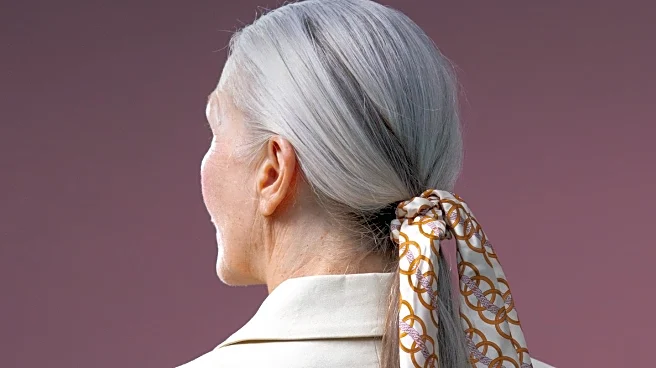What's Happening?
A recent study published in Nature Cell Biology suggests that the process of hair turning gray may be linked to a natural defense mechanism against melanoma, a deadly form of skin cancer. Researchers from the University of Tokyo conducted experiments
on mice to observe how melanocyte stem cells (McSCs) in hair follicles respond to DNA damage. They found that under stress, McSCs either differentiate and exit the system, leading to gray hair, or continue dividing, which could result in tumor development. This indicates that gray hair might be a sign of avoiding melanoma, as the stress-induced differentiation of McSCs could guard against harmful cells. The study reframes hair graying and melanoma as divergent outcomes of stem cell stress responses, although it does not suggest that gray hair prevents cancer.
Why It's Important?
The findings of this study could have significant implications for understanding the biological processes behind aging and cancer prevention. Melanoma is one of the most dangerous types of skin cancer due to its ability to spread rapidly to other parts of the body. By identifying the potential protective role of gray hair, researchers may be able to develop new strategies for cancer prevention and treatment. This research highlights the importance of stem cell responses to stress and their role in health and disease. It also opens up new avenues for exploring how lifestyle factors and environmental stressors impact stem cell behavior and cancer risk.
What's Next?
Further research is needed to fully understand the relationship between gray hair and melanoma. Scientists aim to explore the mechanisms behind stem cell differentiation and tumor development in greater detail. This could lead to advancements in cancer prevention strategies and treatments that leverage the body's natural defense mechanisms. Additionally, public health initiatives may focus on educating individuals about the potential benefits of embracing natural aging processes, such as graying hair, as part of a broader approach to cancer prevention.
Beyond the Headlines
The study challenges societal perceptions of aging and beauty, particularly the stigma associated with gray hair. It suggests that natural aging processes may have protective health benefits, prompting a reevaluation of cultural attitudes towards aging. This could influence trends in the beauty industry, encouraging a shift towards embracing natural hair color and reducing the emphasis on cosmetic interventions to cover gray hair.

















